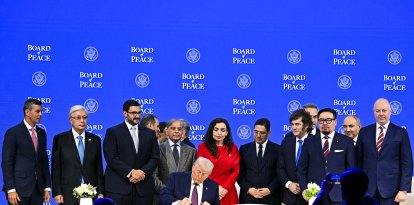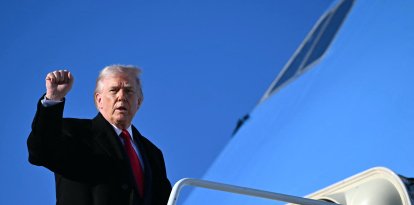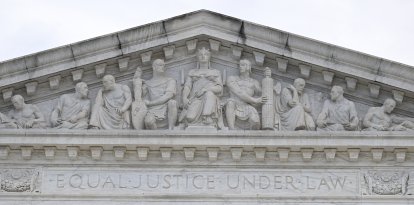Here's how Trump could take down Venezuela's Tren de Aragua criminal gang
The gang's influence now extends to several countries, including Colombia, Chile, Peru, Ecuador, Brazil, and at least 20 states in the United States.

Voice Design
A report by The Heritage Foundation, conducted by Joseph M. Humire, a security expert and executive director of the Center for a Secure Free Society, offers a series of detailed strategies that the Trump administration could implement to curb the advance and expansion of Tren de Aragua (TdA), one of the most dangerous criminal organizations in Latin America. The group, which began in Venezuela, has expanded its operations to several countries in the region, including the United States, and has become a transnational threat that requires a swift and forceful response.
Tren de Aragua: A transnational phenomenon
Tren de Aragua, originally from Venezuela, is known for its extreme violence and for operating a vast network of criminal activities, including drug trafficking, extortion, kidnapping and human trafficking. Its expansion has been alarming, making it one of the most feared criminal groups in Latin America. Currently, its influence extends to several countries, including Colombia, Chile, Peru, Ecuador, Brazil, and at least 20 states in the United States, such as Arizona, California, Colorado, Connecticut, Georgia, Indiana, Louisiana, Maryland, Michigan, New Jersey, Nevada, North Carolina, Tennessee, Utah, Virginia, Wisconsin, Florida, Illinois, New York and Texas.
Criticism of the Biden administration
The expansion of Tren de Aragua under the Biden administration has raised concerns about the lack of a coherent and coordinated strategy to curb the threat of transnational organized crime. A key aspect of this criticism centers on the open borders policies implemented by the Biden-Harris administration, which has allowed for the infiltration and strengthening of criminal networks, including Tren de Aragua, within the United States. According to The Heritage Foundation report, any effort to dismantle this organization must begin by reviewing and ending these policies.
Proposals for international cooperation to dismantle the organization
The report highlights the urgent need for closer collaboration between the United States and its partners in Latin America, especially within the Mercosur bloc, to create a working group dedicated to dismantling Tren de Aragua. This cooperation would allow for more effective tracking of members of the criminal group and the capture of individuals who operate with ease between countries in the region. In particular, collaboration with Uruguay, which has taken a proactive approach in the fight against this organization, could be crucial to designing effective countermeasures.
A combined inter-agency joint task force
Another highlight in the report is the suggestion to create a combined interagency joint task force similar to that used by U.S. Special Operations Forces in the Middle East to combat the Islamic State. This unit, under the direction of the Special Operations Command South (SOCSOUTH), should concentrate on Tren de Aragua, just as Operation Inherent Resolve did with the Islamic State in Iraq and Syria. This force would consist of an interagency group that includes military, law enforcement, and organized crime experts from Latin American and Caribbean countries.
The role of the Department of Justice
The U.S. Department of Justice has a crucial role to play this effort. According to the report, it should place Tren de Aragua as one of its top priorities within the Organized Crime and Drug Enforcement Task Forces (OCDETF). This move would bring together federal, state, and local prosecutors, as well as various law enforcement agencies, to create an integrated strategy against the TdA.
The report emphasizes that, as what happened in 2017 with MS-13, where a coalition of U.S. agencies achieved a major blow against the gang, similar action against Tren de Aragua could seriously weaken its structure and operations in the United States. The involvement of organized crime and drug experts in these actions would help strengthen the response to the changing tactics of the criminal organization, which constantly adjusts its methods to evade justice.
Venezuela's designation as a country of special interest
The report also highlights the need for the U.S. Department of Homeland Security to designate Venezuela as a country of special interest due to the direct links between the Venezuelan regime and Tren de Aragua. The lack of cooperation from Venezuelan authorities in the fight against organized crime and the tacit support that dictator Nicolas Maduro has provided to this criminal group would justify this measure.
Placing Venezuela in this category would facilitate the process of identifying TdA members crossing the border into the United States and allow for better control of Venezuelan immigrants.
White House actions to coordinate the fight against TdA
According to the report, the White House should take an active role in implementing these measures. Through the Council Against Transnational Organized Crime, the Trump administration should coordinate an integrated domestic and international response focused on Tren de Aragua. The White House should task the director of national intelligence with a comprehensive assessment of the intelligence community's capabilities in relation to the group, which will enable the design of a more effective intelligence strategy to track and neutralize TdA operations.
The report also stresses that, at the executive level, the Trump administration has the ability to develop and submit an action plan within 120 days. This plan could address both diplomatic and operational measures necessary to curb Tren de Aragua's influence and dismantle its networks in Latin America and the United States.

























